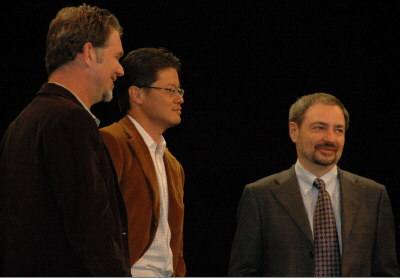TechNet Summit: The new era of innovation

The first panel at this morning's TechNet's Annual Innovation Summit, hosted by Charlie Rose, focused on what's next in the new era of innovation. Panelists included Jerry Yang, founder and Chief Yahoo, Yahoo; Reed Hastings, founder and CEO of Netflix; Brian Halla, chairman and CEO of National Semiconductor; and Charlie Giancarlo, senior vice president and chief development officer, and Cisco.
Jerry Yang started off the proceedings, saying that "large scale companies are creating a lot of value for consumers, and becoming a true economic force." In other words, in a decade Yahoo has became an industry giant, driven by a culture of innovation.
Giancarlo chimed in that the "network is the platform." The panel agreed that the generation of coming up will be a dominant source of innovation, not necessarily the new establishment, such as Yahoo and Google. "Young people will be developing the next company. Anything you can dream up today we can actually build. The question is what are customers going to buy. Customers will define what is successful," Giancarlo said. "There is the utter joy to tearing up the rule book and doing it differently," Hastings added.

Reed Hastings, Jerry Yang, Charlie Giancarlo
Rose asked Yang to define Web 1.0, 2.0 and 3.0. "Web 2.0 is well documented and talked about," Yang said. "The power of the Net reached a critical mass, with capabilities that can be done on a network level. We are also seeing richer devices over last four years and richer ways of interacting with the network, not only in hardware like game consoles and mobile devices, but also in the software layer. You don't have to be a computer scientist to create a program. We are seeing that manifest in Web 2.0 and 3.0 will be a great extension of that, a true communal medium...the distinction between professional, semi-professional and consumers will get blurred, creating a network effect of business and applications."
Hastings came up with a simpler formula for defining the phases of the Web. "Web 1.0 was dial-up, 50K average bandwidth, Web 2.0 is an average 1 megabit of bandwidth and Web 3.0 will be 10 megabits of bandwidth all the time, which will be the full video Web, and that will feel like Web 3.0," Hasting said.
Everyone brings their own perspective, bias to putting a frame around Web X.X. Yang comes at it from the social Web, portal angle, and Hastings from selling movie downloads over the Net, which his company NetFlix is expected to start doing next year.
The discussion then went into the issue of the lack of young people studying science, engineering and math, and that much innovation is happening outside the U.S. Halla suggested government incentives to encourage students to study technology subjects. Hastings railed against U.S. immigration policy. "We have this crazy policy that smart people can't come here--only 65,000 HB1 visas are issued per year," Hasting said. "It absolutely doesn't make any sense. Perhaps in lame duck session of Congress will move on it."
Rose asked why the handheld device has become so central. "We are entering a world where we as consumers are in control and the device follows us." He cited innovations in the mobile form factors, networks and applications. "Mobile is a total fertile ground for creating applications for users, and the technology barriers will come down," Yang said. "There will be more processing power, more reliable broadband with consistency of the network, device and the ability to program devices."
Rose asked if a tipping point had been reached in ecommerce. Yang again took the question, citing a "huge opportunity for mobile commerce."
During a Q&A period with the audience, Yang was asked about the right time get a product in front of users for a startup. He said that Yahoo gets "on the treadmill of innovation and leverages users and consumers to quickly innovate." He added, "There is no guarantee that nobody will copy it. You have to get on the treadmill and run as fast as you can." Yang mentioned Facebook and YouTube as companies that have been successful based at innovating at a fast pace and gathering users. Facebook was an interesting choice of a company to mention, given the rumors around Yahoo acquiring the social networking startup.